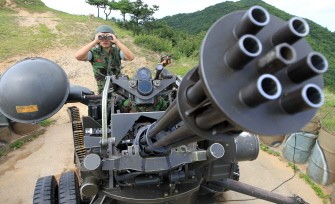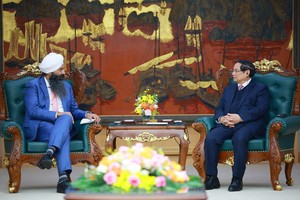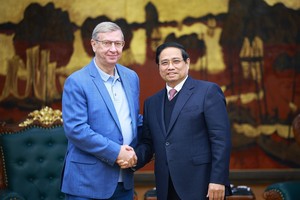SEOUL, Aug 10, 2010 (AFP) - South Korea's military vowed Tuesday to "act resolutely" against future provocations after North Korea fired an artillery barrage into waters near the two countries' disputed Yellow Sea border.
Some 10 of the 130 shells which were fired Monday evening landed on the South's side of the line, Seoul military officials said, heightening months of tensions.

The South's military in a faxed message to the North described the firing as a "grave provocation" that violates the armistice and a non-aggression agreement, a spokesman for the Joint Chiefs of Staff told AFP.
"If North Korea continues its provocative actions, without apologising for the Cheonan incident, South Korea will act resolutely," the spokesman quoted the message as saying.
Tensions have risen sharply since late May when South Korea and the United States, citing a multinational investigation, accused the North of torpedoing one of Seoul's warships, the Cheonan, near the contested border.
The South staged its largest-ever anti-submarine exercise as a show of force in response to the March sinking. The five-day exercise ended just before the North's artillery salvos began.
The North, which denies involvement in the Cheonan case, describes the South's war games -- and an earlier joint exercise with US forces -- as a military provocation designed to trigger a war.
It has threatened retaliation, including with nuclear weapons, to any attack. Rodong Sinmun, newspaper of the ruling communist party, repeated the threat Tuesday.
The North "will clearly show to those buoyed by war fever what a real war is like, any time it deems necessary, through a war of retaliation of its own style based on its nuclear deterrent", it said.
The US State Department criticised the artillery barrage.
"It is not a helpful sign by North Korea and this is exactly the kind of behaviour that we would like to see North Korea avoid," said spokesman Philip Crowley.
Crowley said it was unclear what Pyongyang hoped to achieve by such "chest thumping" and said: "The firing of a very large number of rounds in the region is the last thing we want to see and is not the best way to reduce tension."
Relations worsened further after North Korea last weekend seized a South Korean squid fishing boat operating off the east coast.
Seoul has urged Pyongyang to free the 41-ton boat and its seven crewmen -- four South Koreans and three Chinese -- as soon as possible.
The South's coastguard has said the boat was presumed to have been operating in an exclusive economic zone proclaimed by the North when seized. There has been no word from Pyongyang on the incident.
Army colonels from North Korea and the US-led United Nations Command met Tuesday at the border truce village of Panmunjom for a fourth round of talks about the sinking of the Cheonan, but appeared to make little progress.
The UN Command has been based in the South since the end of the 1950-1953 Korean War to enforce the armistice which ended the conflict.
A UNC spokesman told AFP the two sides met for more than two hours. "Basically, they agreed to meet again at the colonel level but they did not set a date," he said.
At a previous round of talks the North demanded the right to send investigators to the South to inspect evidence dredged from the seabed, including what Seoul says is part of a North Korean torpedo.
South Korea has rejected the demand, saying the UN Command should handle the case as a serious breach of the armistice.
























